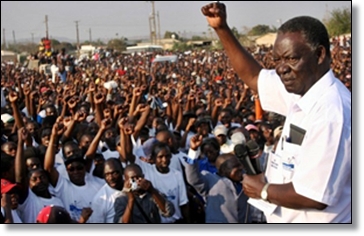Zambia: Donchi Kubeba and President Sata's Triumph

 |
| Mr. Sata on a campaign trail Photo courtesy |
“Don’t Kubeba,” popularly whispered as Donchi Kubeba, a slogan adopted by the PF party in the run-up to the 2011 election, is quintessentially a Machiavellian postulation. It is attributed to President Michael Sata. It is a transmogrification of the English “Don’t” and the Bemba “Kubeba (tell).” It literally means “Don`t Tell.”
Don’t tell or don’t say a word, understood plainly, denotes that the PF party members could accept campaign materials intended for other political party members. PF members were encouraged to accept inducements, kick-backs or indeed, any other forms of lures offered by other political parties without the PF members disclosing their allegiance to the PF party.
The expression is particularly common in the Zambian justice system. Child molesters use it; money launderers are fond of it; and drug traffickers have made shrines around it. Those who cheat on their spouses also use it. To all these groups it means only one and the same thing: indulge but do not reveal. The Words of Agur puts it correctly: “This is the way of an adulterous woman: she eats and wipes her mouth, and says, `I have done no wrong.`”
Omertà: Is it a Form of Corruption?
There is no denying, across the board, that Donchi Kubeba delivered results for the PF. To many, Donchi Kubeba was a winning proposition. To some it was repugnant as it was corrupt. Those who did not agree with the PF slogan contended that it was a theory imbued in corrupt practices. Someone wrote: “What scares me is not that PF sympathisers embrace it; what scares the hell out of me is that an entire party president such as Mr. Sata can embrace such an evil slogan and encourage his members to practice it.”
Some have equated Donchi Kubeba to Omertà. Wikipedia defines Omertà as an,
…attitude and code of honour and a common definition is the "code of silence." It is common in areas of southern Italy, such as Sicily, Apulia, Calabria, and Campania, where criminal organisations defined as Mafia such as the Cosa Nostra, 'Ndrangheta, Sacra Corona Unita, and Camorra are strong. It also exists to a lesser extent in certain Italian-American neighbourhoods where the Italian-American Mafia has influence and other Italian ethnic enclaves in countries where there is the presence of Italian organised crime (i.e. Germany, Canada, and Australia).
A. Zyambo, argues that Omertà is hugely embraced by the Mafia, and it implies “the categorical prohibition of cooperation with state authorities or reliance on its services, even when one has been victim of a crime.” Even if somebody is convicted of a crime he or she has not committed, he or she is supposed to serve the sentence without giving the police any information about the real criminal, even if that criminal has nothing to do with the Mafia.
Abrogating omertà is punishable by death. Like Omertà, Zyambo argues, Donchi Kubeba portends evil for Zambia. It is immoral as it is very negative. It has the propensity to tear homes apart, aggravate morality and encourage corruption. Zyambo then makes a charge: “It is sad that it is officially advertised now and as the old saying goes `charity begins at home,` seeing a political party embrace such slogans at party level simply implies that even at national level they will have no difficult in doing likewise.”
Some Zambians failed to understand the thought behind Donchi Kubeba. However, they understood the importance that language plays a very important part in politics. In the art of politics, the so-called enemy can be good, beautiful, and even economically profitable, only if the powerful do not build their castles on the sweat and chants of the poor. Bottom-line, however, is that there are no real enemies in politics. Criticism is very helpful to either the ruling party or the opposition. The thunder of Donchi Kubeba and Nafuti Nafuti were, in that regard, not a disturbance in the Zambian political proclivity.
The slogans of Donchi Kubeba and Nafuti Nafuti effused a sense of national pride in the 2011 election campaigns. They pitted two strongest parties on pseudo-ideological lines, and one won. Some compared their impact to the Zambian National Anthem itself. Each time Zambians chant it, it reminds them of the struggle they went through and the freedom they achieved. Zambians are all brothers and sisters in one nation. As such, they should guard, with pride, the peace that they have enjoyed since independence.
Read More
By Charles MwewaAuthor: Zambia-Struggles of My People
